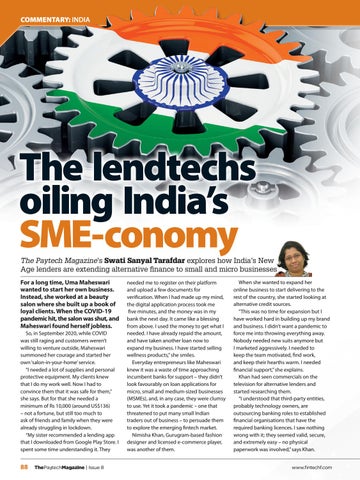COMMENTARY: INDIA
The lendtechs oiling India’s SME-conomy
The Paytech Magazine’s Swati Sanyal Tarafdar explores how India’s New Age lenders are extending alternative finance to small and micro businesses For a long time, Uma Maheswari wanted to start her own business. Instead, she worked at a beauty salon where she built up a book of loyal clients. When the COVID-19 pandemic hit, the salon was shut, and Maheswari found herself jobless.
So, in September 2020, while COVID was still raging and customers weren’t willing to venture outside, Maheswari summoned her courage and started her own ‘salon-in-your-home’ service. “I needed a lot of supplies and personal protective equipment. My clients knew that I do my work well. Now I had to convince them that it was safe for them,” she says. But for that she needed a minimum of Rs 10,000 (around US$136) – not a fortune, but still too much to ask of friends and family when they were already struggling in lockdown. “My sister recommended a lending app that I downloaded from Google Play Store. I spent some time understanding it. They
88
ThePaytechMagazine | Issue 8
needed me to register on their platform and upload a few documents for verification. When I had made up my mind, the digital application process took me five minutes, and the money was in my bank the next day. It came like a blessing from above. I used the money to get what I needed. I have already repaid the amount, and have taken another loan now to expand my business. I have started selling wellness products,” she smiles. Everyday entrepreneurs like Maheswari knew it was a waste of time approaching incumbent banks for support – they didn’t look favourably on loan applications for micro, small and medium-sized businesses (MSMEs), and, in any case, they were clumsy to use. Yet it took a pandemic – one that threatened to put many small Indian traders out of business – to persuade them to explore the emerging fintech market. Nimisha Khan, Gurugram-based fashion designer and licensed e-commerce player, was another of them.
When she wanted to expand her online business to start delivering to the rest of the country, she started looking at alternative credit sources. “This was no time for expansion but I have worked hard in building up my brand and business. I didn’t want a pandemic to force me into throwing everything away. Nobody needed new suits anymore but I marketed aggressively. I needed to keep the team motivated, find work, and keep their hearths warm. I needed financial support,” she explains. Khan had seen commercials on the television for alternative lenders and started researching them. “I understood that third-party entities, probably technology owners, are outsourcing banking roles to established financial organisations that have the required banking licences. I saw nothing wrong with it; they seemed valid, secure, and extremely easy – no physical paperwork was involved,” says Khan. www.fintechf.com
